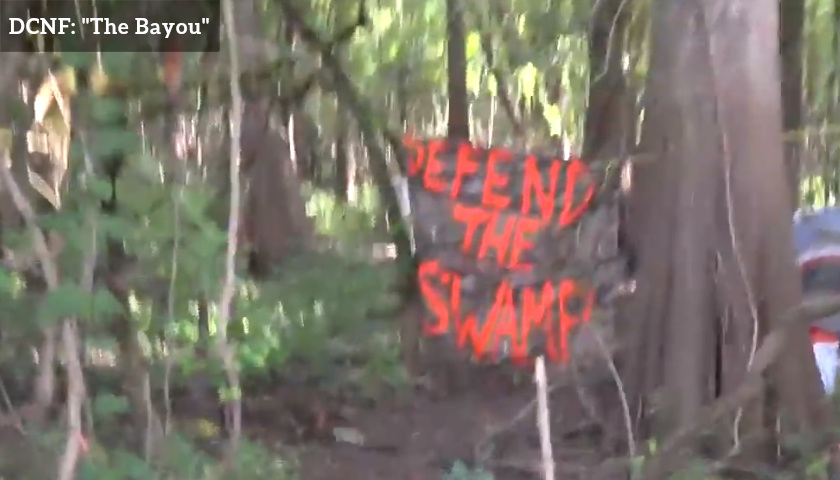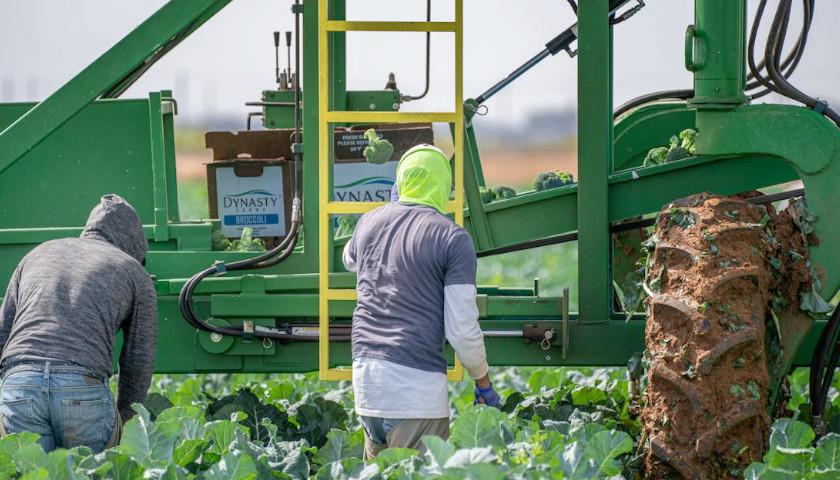by Jason Hopkins
ST. MARTINVILLE, La. — Deep in Louisiana’s Atchafalaya Basin, the largest swamp in the United States, a group of protesters has seemingly stopped at nothing to scuttle completion of a legal pipeline.
The construction project in question, the Bayou Bridge Pipeline, is an 163-mile crude oil pipeline that extends across southern Louisiana. The pipeline will carry up to 480,000 barrels off crude oil a day when completed — taking a lot of oil off more hazardous means of transportation, such as road and train lines.
 Despite the pipeline being overwhelmingly welcomed by locals and Louisiana politicians across the partisan spectrum, construction efforts have attracted an inordinate amount of pushback from national environmental groups. Organizations such as Sierra Club, EarthJustice, Waterkeeper Alliance and others have continually tried to torpedo the pipeline with lawsuits.
Despite the pipeline being overwhelmingly welcomed by locals and Louisiana politicians across the partisan spectrum, construction efforts have attracted an inordinate amount of pushback from national environmental groups. Organizations such as Sierra Club, EarthJustice, Waterkeeper Alliance and others have continually tried to torpedo the pipeline with lawsuits.
However, it’s the opposition happening outside the courtroom that is attracting some of the most extreme elements against Bayou Bridge. Groups such as Louisiana Bucket Brigade and 350 New Orleans have assembled protests at construction sites, temporarily preventing employees from working. The most active group on the ground is L’eau Est La Vie (French for “water is life”), a traveling camp within the Atchafalaya Basin that has repeatedly placed its members in the way of construction efforts, stalling work and placing themselves in danger.
The Daily Caller News Foundation traveled to St. Martinville, Louisiana, to find these protesters. A small camp that relocates every few days or weeks within the country’s biggest swamp — it was not easy to find. After several hours of traveling on air. boat and foot, and passing though what appeared to be a deserted campsite, TheDCNF was able to locate the anti-Bayou Bridge base.
“I don’t really want to speak on behalf of any organization. I am just out here as an individual trying to keep this area safe and make sure nobody cuts that line,” said a man donning a red dress and referring to himself simply as “Babyface.” The protester appeared to be alone, standing next to several tents and signs that railed against the Bayou Bridge pipeline. Clothes were strewn about, along with Twilight novels and a big bottle labeled “pee.”
Speaking softly, Babyface refused to reveal what organization he was with, but he did explain his opposition to construction of the crude oil pipeline.
“I’ve seen some of these valve stations and along the way while I’m traveling on the boat, and those aren’t well kept up at all,” he said to TheDCNF. “I worry about what this pipeline is going to look like 10, 15 years from now – whether they’re really going to do the upkeep to keep this safe. I have my personal doubts.”
After speaking to Babyface for some time, it was discovered that he was not alone. Up above were what appeared to be two separate tree houses, something he referred to as a “lifeline.” Within the lifeline contained his fellow protesters. The concept was simple, but dangerous. As long as the protesters remained suspended in tree houses, construction workers would be prevented from cutting the trees down. This tree-sitting strategy is widely implemented by pipeline protesters across the country.
While they believe their cause to be just, many residents of southern Louisiana are upset at the protesters’s actions. Many in the community welcome the jobs and income that come with Bayou Bridge.
“The people that work on these pipelines, they have a right to make a living too,” said Brett Stassi, sheriff of Iberville Parish, in a conversation with TheDCNF. “They are putting the livelihood of some of these workers in jeopardy, and their putting their own self in harm’s way.”
Stassi also repeated what’s been long criticized about the Bayou Bridge protesters: many of them are from out of state.
“Most of these protesters are not even from Louisiana. They come from all over the United States – as far California. We even arrested one from France,” he said.
A procurement agent who works between Energy Transfer Partners — the company behind the pipeline — and local landowners told TheDCNF he hasn’t met a single customer who appreciates what the protesters are doing. They welcome the development and extra income the project is bringing.
“I’ve been working with landowners and Energy Transfer Partners (ETP) this entire time. Every single local landowner I’ve worked with supports this project. None of them have any sympathy for the protesters,” he explained, speaking anonymously as he was not allowed to talk with media.
A spokeswoman for ETP told TheDCNF that over 98 percent of the easement agreements along the route were signed voluntarily by landowners.
However, protesters have vowed to stay as long as construction continues in the Atchafalaya Basin. A group of unemployed protesters camping in the middle of a swamp would seemingly be a short-term affair, but the organizations that support their efforts have been adept at online fundraising.
L’eau Est La Vie is very active online with a very repetitive fundraising strategy. Members continually perform extreme acts of protest — such as chaining themselves to a 50-foot crane — and announce it on social media. The group then asks supporters for donations via GoFundMe. It also does this when alleging violence or misconduct by Energy Transfer Partners or arrest of their comrades.
For example, L’eau Est La Vie leaders recently accused ETP of driving past one of their boats in the water so quickly that the splash from the wake eventually sunk their boat. However, their claims about what exactly happened have changed over time, with one spokeswoman originally saying she wasn’t sure who drove the boat that caused the wake but others later claimed for certain that ETP was the offender. They have also given different numbers of how many protesters were affected.
Their tactics have proven lucrative. L’eau Est La Vie has raised well over $72,000 in the past three months, according to their latest GoFundMe page. Members have launched several fundraising efforts since beginning their protest against Bayou Bridge, raising tens of thousands of dollars that allow them to keep camping.
“The bulk of their claims are either false or greatly exaggerated. They are using this narrative as a fundraising campaign,” said Alexis Daniel, a spokeswoman for ETP, in a statement to the The DCNF. “We have stated from the beginning of the project, as with any of our projects, that we understand and respect differing opinions about these types of infrastructure projects. But what we do not support are the illegal actions and false claims that are continually made about the project, our vendors and workers, and the industry in general. Our first priority always remains to the safe construction and operation for all of our assets.”
Construction on the Bayou Bridge Pipeline is nearing completion, and expected to be operational by the end of 2018.
– – –
Jason Hopkins is a reporter for the Daily Caller News Foundation. Follow Jason on Twitter.




